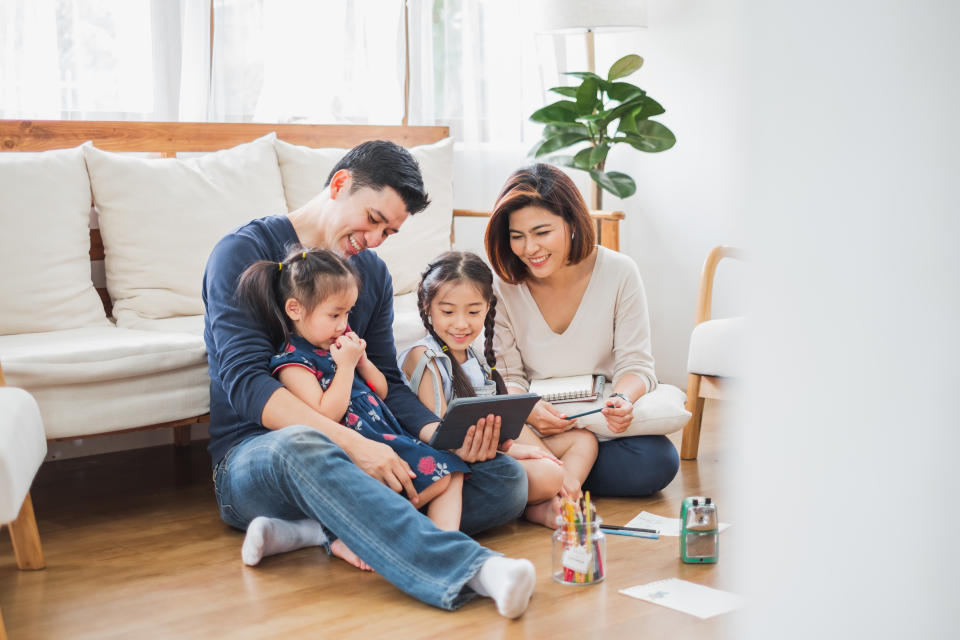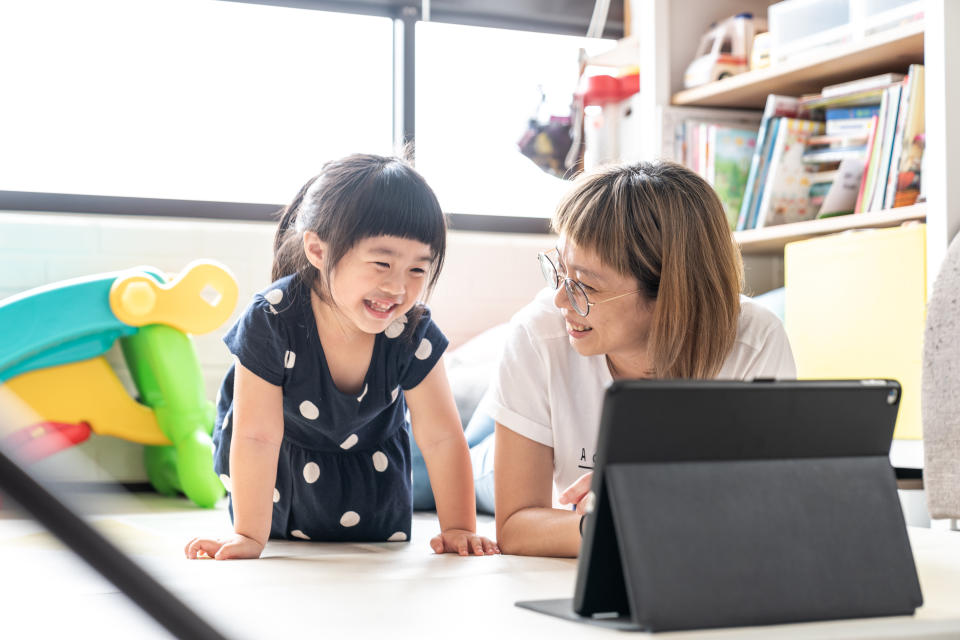How to help your child's mental health in the digital age of COVID-19

We all know we probably shouldn’t be spending so much time on our smartphones and computers, but it is just so easy to lose time following funny memes and videos, or tracking down every little thing about what’s happening with COVID-19 around the world.
And while we are all going to be relying on our digital devices even more, now that we are taking up #stayhome and social distancing, we should also be aware that sometimes too much of a good thing is just too much. This is even more true when it comes to our children.
A recent study released by the International Journal of Mental Health and Addiction, literally entitled: Mental Health Concerns in the Digital Age, found “detrimental impacts on adults, adolescents, and children from continual connectivity”.
According to the report, “... negative consequences from technology overuse impact an individual behaviorally, affectively, and cognitively”. So what we all worried was true, has been proven so.
READ MORE:
Our favourite Asian fitness influencers to follow for home workouts
Cybersecurity tips to keep safe while you work from home
Skincare products to keep you moisturised while you work from home
Working from home: Here are some of the best practices to know
Are you addicted to your digital devices?
“I consider myself addicted to my phone,” explains Athena Khan, a mother in her late 30s. “Though I have a habit of browsing fashion brand's websites, and taking screenshots of things I might buy, I consider myself addicted to social media. I am even on my phone in my bed before sleeping and usually in the mornings.”
Khan says it is both a “good and bad”, but overall thinks her addiction is more bad than good. “The only good thing is I can be aware of what's happening around the world in an informal way. And it gives me a kind of company when I am a bit alone, so far away from my parents, siblings, and friends who live in Pakistan.”
“I'm rather addicted to social media because life is rather boring as a stay home mom,” explains Kiki-Nuria Tjai, also in her late 30s. “One of my pastimes to ‘kaypoh’ on people on social media.
“[But] I also have several online businesses hence social media is a must visit every morning and night to monitor business growth, followers, promotions, etc.”
Khan and Tjai are not alone. Yvonne Poh, hopes she’s not addicted but she thinks she could be.
“I hope I don't fall into the categorisation of being addicted to technology but I find myself being very uncomfortable if I go somewhere without my phone or if my phone's battery were to go below 50%”, explains the working mother of three.
“Social media can be quite addictive and feeds one's inner narcissist. Humans are wired to admire beautiful things and Instagram fits the bill perfectly,” says Poh.
“Mindlessly scrolling through Instagram can be very addictive. I'm not personally affected by the content I see on Instagram as I tend to think it's mostly contrived; but I can see how it may affect someone's self esteem or pander to someone's feelings of inadequacy.”

Too much digital media can be bad for you
The issues of low self-esteem, inadequacy, and insecurity that are often engendered by social media, are central to some of the mental health issues connected to being dependent on our digital devices.
The study reported that: “Consequences of attachment to technology include lowered social skills, self-motivation, emotional intelligence, and empathy and increased conflict with others, ADHD, and depression in younger populations.”
And also, that: “Mental health concerns increase with society’s reduced social interactions resulting from increased technological use and dependence on social media for communication.”
However there is hope that certain interventions can be made to stop dependence on digital devices from turning into a major mental health concern. The study stated that: “Advantageous counseling interventions and treatment options are discussed as methods to reduce effects of technology abuse and isolation from the real world and help clients find a balance in connectivity.”
Khan admits that being on her phone, particularly using too much social media has sometimes affected her mental health.
“Just three nights ago I had a problem sleeping because of reading about the ignorance shown by Pakistani people over women's rights and the opposition to [a recent] women's march there,” explains Khan.
“So, [using] social media makes me depressed on occasion and affects my mental health in quite a negative way.”
How to manage your use of digital devices
Before your use of digital devices becomes a problem, you need to work out what is balanced usage for you, and the lifestyle you lead.
“I'm spending a lot of time online at work and after working hours, [so] I'm now consciously trying to engage in other activities offline. Starting with putting my phone away from the dinner table when I'm having dinner, and setting quiet time from 10pm-7am on my phone (where notifications are muted),” says Poh.
Khan says that while she feels she lacks a bit of willpower when it comes to staying away from her digital devices, she is trying to set some boundaries for herself.
“I make an effort to put my phone away and call my kids for hugs and cuddles. And I avoid my phone when I am helping my kids with their homework. I don't use social media around guests, or when out with family friends, or at someone's house,” says Khan.
“I guess instead of trying to manage the time [I spend on my mobile], I try to set a limit for certain situations when I allow myself to use my mobile. I think I am on my phone the most when I am at home.”
“I spend about seven to eight hours on my mobile daily for work and people stalking,” says Tjai. “I think it’s a little too much so I am trying to cut down on watching nonsense stories if I can.”

What about your kids and digital devices?
If your children are school age there is no way you can avoid them having to use digital devices since most schools expect their students to either work on a laptop or tablet, or have classes that need these devices. We are all also used to being able to contact our children at any time of the day, so most kids have their own mobile phones.
Tjai says her three-year-old daughter has her own tablet that is used to help teach her the alphabet, or give her activities to do like singing and dancing. However, Tjai admits that she also uses the device to ‘tame’ her daughter when needed.
“I [use the tablet] to keep her still at mealtimes, or keep her tame while we are outside. The [tablet] can be a lifesaver at times; when they are cranky sometimes nothing else works.”
Poh also allows her children to use various digital devices, however she does monitor the amount of time they spend on them.
“I believe that it's good to get my kids accustomed to technology and devices as they will be the digital natives of the future,” explains Poh. “But they must recognise that it's only a tool as a means to an end and not be enslaved by it.”
“Currently, I'm letting my kids have 30 minutes of screen time (tablet or TV) every night. And they have to earn more screen time if they want it - by reading books or helping out around the house.
“I'm worried about them getting hooked and prioritising screen time over other activities.”
Don’t panic! Digital devices can be good too!
During the current COVID-19 pandemic, we really can’t do without our digital devices. We need to get information quickly, we need to entertain ourselves if we are stuck at home, and we need them to order in if we are quarantined.
“Social media is a good platform during this COVID-19 period. Users get the latest updates about what's happening around the world. It was so different during SARS in 2003 when there was no social media, so there was not as much news and information on things like virus updates,” explains Tjai.
Khan agrees that being able to stay in touch with her family members overseas during the period of uncertainty has helped her from feeling too isolated or depressed.
SINGAPORE
For information about the Covid19 outbreak in Singapore go to https://www.gov.sg/features/covid-19.
If you are struggling with thoughts or feelings about suicide, contact SOS on 1800 221 4444 (24hrs). If you have concerns about mental health issues, contact Emergency Helpline (IMH) on 6389 2222 (24hrs). For more information and help dealing with mental health issues, go to www.healthhub.sg/findhelp_servicesformentalhealthsupport.
MALAYSIA
For information about the Covid19 outbreak in Malaysia go to http://www.moh.gov.my/index.php/pages/view/2019-ncov-wuhan.
If you are struggling with thoughts or feelings about suicide, contact Lifeline on (+603) 4265 7995 (24hrs). If you have concerns about mental health issues, contact the Malaysian Mental Health Association on (+603) 7782 5499. For more information and help dealing with mental health issues, contact the Befrienders on (+603) 79568144 or (+603) 7956 8145; or go to www.befrienders.org.my.
PHILIPPINES
For information about the Covid19 outbreak in the Philippines go to https://www.doh.gov.ph/2019-nCoV.
If you are struggling with thoughts or feelings about suicide, contact Lifeline on (02) 8969191 or 0917 854 9191. If you have concerns about mental health issues, contact the National Center for Mental Health (NCMH) Crisis Hotline on 0917 899 8727 (USAP) and 989 8727 (USAP). For more information and help dealing with mental health issues, go to the National Center for Mental Health at ncmh.gov.ph.



